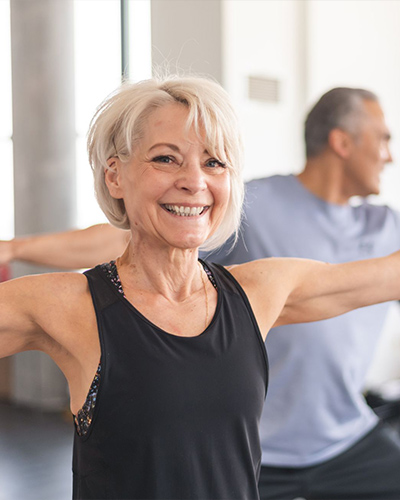Health and Fitness for Seniors
While there’s no fountain of youth that offers eternal life, our daily choices and habits, especially as we age, wield significant power over our health and vitality. Living an active and balanced lifestyle that includes an amalgamation of aerobic, muscular strength, flexibility exercises, and tailored fitness programs for seniors helps you avoid a wide range of diseases, slows the rate of muscle tissue loss, and improves activities of daily living. Here are some of the cardiovascular and cognitive benefits that come with living a healthy lifestyle

The Many Benefits of Cardiovascular Exercise
The heart and lungs naturally experience a reduction in efficiency and strength over time, especially in sedentary populations. With advancing age, the heart must work harder to accomplish the same amount of work at rest and during activity. Resting heart rate also declines to one beat per minute each year. Correspondingly, the lungs lose some of their ability to supply adequate amounts of oxygen to the working tissues and organ systems. Regular exercise, however, helps increase systemic blood flow and oxygen supply. New exercisers often report feeling more energy in their daily adventures, likely a function of improving cardiovascular fitness.

Becoming and remaining physically active and incorporating aerobic exercise (walking, aquatics, cycling, classes, etc.) can lower and control blood pressure, which reduces the overall stress on the heart. Activity can also help drop cholesterol levels and prevent atherosclerotic buildup in the arteries. Further, individuals who stay active lessen their risk of all-cause mortality and premature death from preventable diseases. So, while you may not be able to outlast Father Time, you can undoubtedly walk far enough ahead, making it difficult for him to catch you.
Benefit Your Brain for a Better Life
The brain is an exceptionally remarkable puzzle. Modern medicine’s exploration of the brain is an ongoing journey that could span lifetimes without uncovering all the intricacies of its enigmatic network. The brain is persistently changing in size and functionality, which highlights the importance of activities such as cognitive exercises and fitness for seniors. Typical age-related changes include decreased brain weight and size (not significant, but still a reduction), network size, and blood supply.
The aging brain also experiences the following:
- Memory loss
- Decrease in inductive reasoning skills
- Mental acuity
- Decrease in spatial awareness
- Development of balance issues
No one is immune to changes in the brain, but exercise and physical activity (along with proper diet) significantly slow the rate of cognitive dysfunction. Think about it in these terms—what’s good for the heart is also good for the brain.
Overall, exercise improves memory, enhances thinking and problem-solving skills, boosts brain-supporting hormones, enhances blood and oxygen flow to the brain, acts as a natural antidepressant and stress reliever, and improves focus, allowing you to concentrate on difficult or challenging tasks. In short, keep on your toes to keep the mind sharp.
Never Too Late

Exercise is and will always be one of the primary keys to living well. No one can halt or reverse the circle of life, but we can impact how we experience “the ride.” And it’s never too late to start making healthy choices to better your future.
Remember This
A balanced, nutritious diet is essential for maintaining health, especially as individuals age. Several studies suggest that consuming a diet rich in antioxidants and anti-inflammatory components, such as those found in fruits, nuts, vegetables, and fish, may reduce age-related cognitive decline and the risk of developing neurodegenerative diseases. Optimizing gut microbiota-gut-brain axis and nutrition impact brain function in general and cognitive processes during aging. Dietary interventions designed to enhance the levels of macro and micronutrients and maximize the functioning of the microbiota-gut-brain axis can be of therapeutic value for improving cognitive functioning, particularly during aging.
Fight to the End

Along with aging comes accelerated muscle loss, making fitness for seniors increasingly important. Engaging in weight-bearing activities such as lifting weights, walking, stair climbing and descending, and performing bodyweight exercises can help prevent this. Accidental falls are a leading cause of death and disability for those over 60 years of age. In 2021, almost 40,000 people died due to taking an unintentional tumble according to Centers for Disease Control and Prevention. Thousands more broke bones or required major orthopedic surgery because they might not have had the muscular strength to stop a severe fall.
Don’t Smoke Your Joints
As we age, our joints, especially the knees, hips, and ankles, age too. They become less lubricated and can develop osteoarthritis, which is painful and lifestyle-limiting. Excess body weight only makes the problem worse. Keeping your Body Mass Index (BMI) in the normal range (under 25) will go a long way toward helping stave off joint pain that often comes hand-in-hand with days on the calendar.
United Health Care Partnership
For Las Vegas seniors looking to prioritize their health and well-being, LVAC is the place to be. Discover our exclusive program, ‘Renew Active,’ previously known as ‘SilverSneakers,’ in partnership with UnitedHealthcare. This program offers a wealth of benefits, from discounted gym memberships to group fitness classes and personalized training sessions.
With LVAC, seniors can take charge of their fitness journey in a supportive and welcoming environment. Whether it’s staying active with group classes or receiving personalized attention from our expert trainers, ‘Renew Active’ is designed to empower seniors to live their best lives.
Don’t let age hold you back – join us at LVAC today and unlock a world of health and vitality. Visit us to learn more about the ‘Renew Active’ program and how it can benefit you!”



